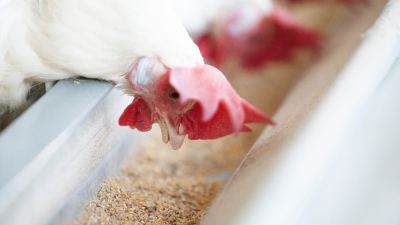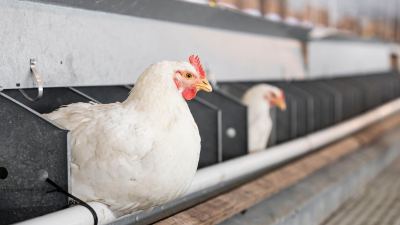Crisis in Cape Town: How farmers cope with critical water shortage

A dam sits empty near the drought-stricken city of Cape Town, South Africa. Farmers in the region are adapting to the water shortage crisis, reassessing their management strategy while maintaining focus on conservation and efficiency.
The following is an edited transcript of Tom Martin's interview with Robert Walker, CEO of KEENAN, an Alltech Company. Click below to hear the full interview:
Tom: The world got a very real taste of the drought-driven water shortages occurring from South Africa and Mozambique to India when Cape Town came very close to “Day Zero” — the day when water levels in the city's reservoirs would fall below a “red line” of 13.5 percent of capacity and household water supplies would be shut off. Everyone would be forced to queue at water stations for a meager daily ration of H2O. The city of 4 million people imposed severe water restrictions. The city managed to conserve enough to push Day Zero down the road perhaps for a few months, but not without the help of farmers north of Cape Town, who opened their dams to allow millions of liters of water to flow down to the drought-stricken city. There has been plenty of coverage of how the water shortage has impacted Cape Town. What is less known are its effects on agriculture in the Western Cape province. Robert Walker is the South African-born CEO of KEENAN, an Alltech company that is a global leader in machinery that helps farmers mix feed and distribute it to their animals. The company is a pioneer in the “internet of things” market for agriculture, having merged its range of machinery with innovative digital technologies that enable farmers to feed their animals with precision and consistency. We thank you for joining us, Robbie.
Robert: Hi, Tom. Glad to be with you.
Tom: So, tell us what the KEENAN team is doing to help farmers in the affected areas around Cape Town cope with this water crisis?
Robert: Tom, it’s quite a tragedy, and it's important that everyone pulls together at this moment. The KEENAN and Alltech group are doing three things: We all are participating and are a major driver in the Grass Hope Project. This is an interesting project whereby we are sourcing urban roughage — clippings from gardens, parks and other municipal installations in the center of the city — and we are having all of that delivered to our facility at Alltech. We bale that roughage, and then that gets distributed to farmers. One of the biggest problems is that farmers just don't have enough roughage for the animals.
The second big thing that we're doing that seems to be making an impact is connecting farmers. The farmers in the south of the country around Cape Town really don't have enough roughage, whereas up in the north, you'll have a lot of farmers who have sufficient amounts or have other byproducts that they can give or sell to those farmers themselves. So, we’ve been connecting those farmers so that we can get roughage from the areas of plenty to those in areas of need.
And the last thing we’re doing is helping with the diets of those farms that are affected. Because when they start buying all these different byproducts or use completely different ingredients, these farmers need to have the diets reformulated and reevaluated because they are completely unfamiliar ingredients. And then, of course, they’re changing almost daily. So, those three things seem to be making quite a big impact.
Tom: For perspective, how important is agriculture to the socioeconomic makeup of the Western Cape province?
Robert: The Western Cape is the garden of sub-Saharan Africa. It is somewhat like what California is to the United States. It's where most of the export-grade fruit is produced. Specifically, you have crops like apples, peaches, plums and pears. You also have a big wine industry — grape industry. So, they are very high-value crops. All of these crops are exported by and large to Europe and the East at a very high value. So, this has hit the South African economy, and really the sub-Saharan African economy, quite hard because that is a major driver of revenue in that geography.
Tom: I mentioned in the introduction Mozambique, India and Pakistan also experiencing this kind of situation. Would you say that what we're seeing happening in Cape Town is something of a bellwether that the world should pay attention to?
Robert: It certainly is an initial indication of what could be and what seems to be becoming more the norm. What’s important here is that you can see that the infrastructure planning around this problem has just not been there. I'm not accusing governments, necessarily. What I'm saying is that the infrastructure is not suited to or adept at addressing these problems. So, it’s probably wise for a lot of these different countries and municipalities around the world to start thinking about what they should be doing in this case. Cape Town is a very good example of where a lot of countries and cities are going.
Tom: I wonder what specific issues have come up as your team has become more familiar with this water crisis situation.
Robert: As a company, we’re mostly focused on the animal side. The biggest issue that we’re seeing is, first of all, roughage — availability of feed stuffs. What’s quite bizarre, Tom, is that you have situations where, for example, a ton of corn might be cheaper than a ton of soya hulls or a ton of wheat bran. The cost of just basic, very cheap roughage is just spiraling out of control. That makes it very difficult to deal with from a production perspective.
Then, of course, you’ve got the bigger problem of the national herd. So, animals are being culled. And, of course, you’re not only losing numbers, but you’re also losing genetics. In the near future, when we need to bounce back, it can be very difficult to start breeding again.
On the crop side, fruits are probably going to be the most affected. As I previously mentioned, that region is renowned for its export- quality fruit, and it is an export-based economy, but the low rainfalls have meant that the fruit quality is just terrible. It’s very difficult to achieve export-grade fruits, which means that you end up with a glut of low-quality fruits on the local market but no export-quality fruit. There are some quite profound changes that I think are going to have some quite long-term effects.
Tom: It looks like Cape Town has, for now at least, dodged the “Mad Max” scenario, by cutting residents’ average water use in half. But thanks to this drought that really is showing no sign of abating, the city could soon become the world's first major urban area to run out of water. Is the KEENAN team hearing much talk about linking this situation to climate change?
Robert: Well, farmers like to talk. And, certainly, there's a lot of talk of climate change. In fact, this situation has been building since about 2015. Farmers there on the ground will be telling us that they've noticed a change in the weather. The winters have been warmer for the last three years, and they aren't getting that fog that they're accustomed to in the winter. What's interesting to note, though, is that a lot of the farmers have said that this year they've noticed a change in the weather. The weather seems to have returned to more of a normal pattern. A lot of those farmers have actually planted. Based on that, they think that this situation is about to resolve and that the rains will come as normal. So, yes, farmers are thinking that it is climate change-related, but that’s very much about farmers who know the weather and just going by their own instincts.
Tom: Interesting. Some positive thinking going on there. Are conservation efforts being imposed in Cape Town in the rural farming areas? Are they taking things in hand in that way?
Robert: Yes. There have been quotas instituted in the rural areas, so farmers are severely restricted on what they can do and where they can get their water. What has been positive about this, though, is the community spirit, and this attitude of helping one’s neighbor. That has really brought farmer and city together, which has been a quite unexpected upside of this disaster.
Tom: That sharing of water, for example.
Robert: Yes. Absolutely. There has been a sharing of water. The farmers have extended a helping hand to the city.
Tom: And the farmers — or at least the associations they belong to — operate their own private dams. Is that correct?
Robert: Yes, they do. So, most of the farmers in South Africa have fairly large pieces of the land, and a majority of them would have owned water, whether that comes from boreholes, wells or dams. There's normally a good supply of water on those farms.
Tom: Are those privately owned dams in better shape than the municipal ones in Cape Town?
Robert: Yes. Absolutely. The privately owned dams are not full, but they are located further up in the mountains, so they tend to have remained at decent levels. There is water there.
Tom: The Cape Town situation is hardly resolved. It’s going to take years of this austerity before the reservoirs refill, if they ever do. The six major dams that make up the city's water supply system are, at present, an average of 19 percent full. City officials are saying the dams will have to recover to at least 40 to 50 percent in order to avoid drastic water rationing during the summer of 2019. What are the prospects for that level of recovery? I know that you say the farmers are pretty optimistic about it.
Robert: The farmers are quite optimistic, but this is going to take a long time to resolve. So, for example, a lot of the farmers have had to cut their production. They’re irrigating only small parcels of land. There are prospects of recovery, certainly on the production side, but it’s going to be a slow road to recovery. When it comes to how quickly those dams are going refill, it's very difficult to say. There is a positive outlook for the coming season, certainly from the farmer’s own feeling, as well as from the meteorological services, but it's going to be a long road to recovery. A lot of those farmers have also supplied a lot of their water from their dams into the city. Those dams, as you said, are now also reaching critical levels.
Tom: In the meantime, Cape Town is implementing some stiff water tariff increases. Are those additional costs likely to impact farms in the province, or do they rely solely on their private sources?
Robert: No. The farmers generally rely on their own private sources, but they will be subject to quotas. In the city, the tariffs are very steep. The cost of water is very high, and the usage of water is very low on a per-person basis.
Tom: Do you hear anything about the possibility of desalination as a solution? I know they tried it in Adelaide, Australia, for example, and it's had mixed results, but is there talk of that in South Africa?
Robert: There’s certainly a lot of talk of that, and it goes back to what I was saying a little bit about the government infrastructure and planning. A lot of people are quite angry, saying that there should have been better planning to avoid this situation. When it comes to desalination, there's a lot of talk about it.
There is an ongoing project — I'm certainly not up to date on it — but it is seen as something that is going be quite small and won’t necessarily satisfy all the needs. It's expected to help in times of emergency. A lot of the farmers are now drilling new wells and they are still finding groundwater, much like the crisis that hit California a couple years ago, where farmers’ wells started running dry. I think we still haven’t gotten to the stage where farmers’ wells are running dry, and there’s still scope for drilling new wells. The disaster, or the lack of water, really is very much in the Cape Town region, the city itself. Of course, farmers are suffering, but there is still water.
Tom: There's an old saying that necessity is the mother of invention. Crises often have ways of inspiring innovation. Has that happened in this case?
Robert: I think innovation is going to take some time. There certainly seems to be a lot of innovative projects ongoing. One of the things that has happened is that farmers are very carefully assessing how they plan their production. For example, the farmers who raise high-value fruits and vegetables have decided to only irrigate smaller portions of their land. They give all of their resources to only a limited amount of the crop so that they can guarantee to get export-quality fruit. They can then export that fruit rather than have a mediocre crop across the land.
So, you have this attention to detail and attention to a very small part of their production. There has been a very big move toward conservation. Drip irrigation has certainly been taken up, and a lot of the technology ... has certainly been adopted. As a company, we focus a lot on efficiency of production. What’s important is that farmers are able to use fewer resources to do more. We are finding that farmers are very open to listening when we speak to them about new technologies, whether it be technologies for the animals or crops in terms of nutrition, or whether it’s mixing technologies for their machinery or digital technologies just to monitor all of that.
They certainly seem to be open to listening and want to improve efficiency, because a more efficient system is obviously going to be better for the environment and give better results in the end. So, I do expect more innovation to come through, and it's exciting to see that farmers are able to be so innovative and adaptive in this kind of situation.
Tom: Do you anticipate keeping your team in South Africa's Western Cape province for the foreseeable future?
Robert: Absolutely. The team is doing a fantastic job. From that Cape Town region, we are able to work into the whole of sub-Saharan Africa. It is very much a springboard for us into Africa. What we've managed to do there is tie in our machinery division, our nutrition division and our crop division so that we can give 360-degree support to farmers. That Western Cape region is very vibrant. It is the center of agriculture in the region. We have no intention of leaving it.
Tom: Robbie, this is a very personal thing for you. We’re talking about your home. You must have some pretty strong feelings about what's going on there.
Robert: Absolutely, it is. There’s a mixture of anger, sometimes, because you often think the government could do more or they could have planned better, but then again, this is nature. It's difficult to judge. South Africa is very prone to drought. This drought in this region is really just an extension of the drought that has happened previously in the northern parts of the country. South Africa is prone to bad weather or weather variations, extreme weather, and it seems to be getting worse and worse. Certainly, as someone who's involved in agriculture, I find that heartbreaking. It's very difficult to see the situation and, yes, hard to watch.
Tom: Robbie Walker, CEO of KEENAN, thank you so much for taking the time.
Robert: Great. Thanks very much, Tom.















